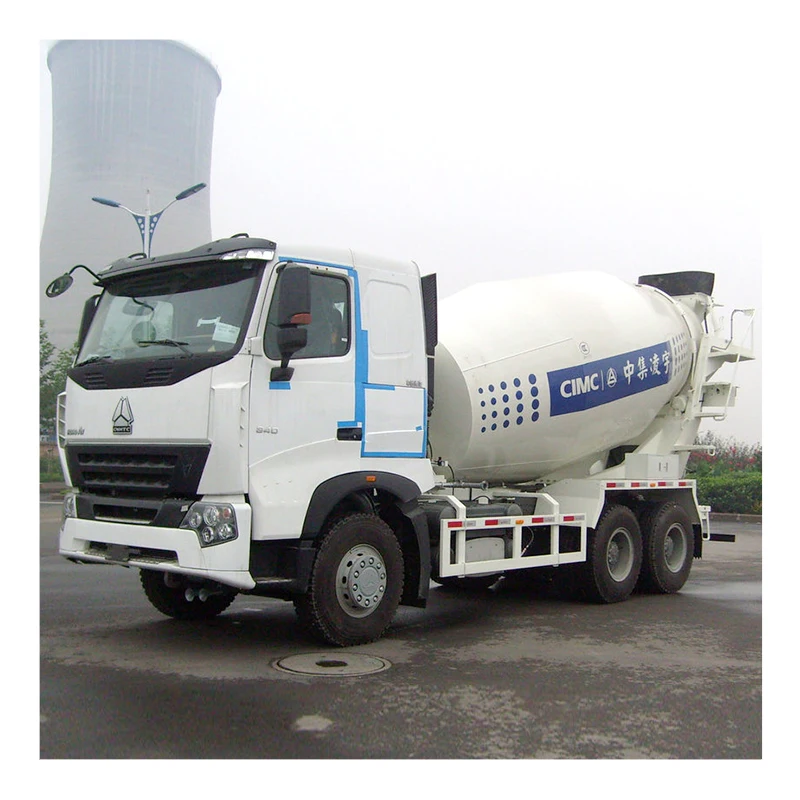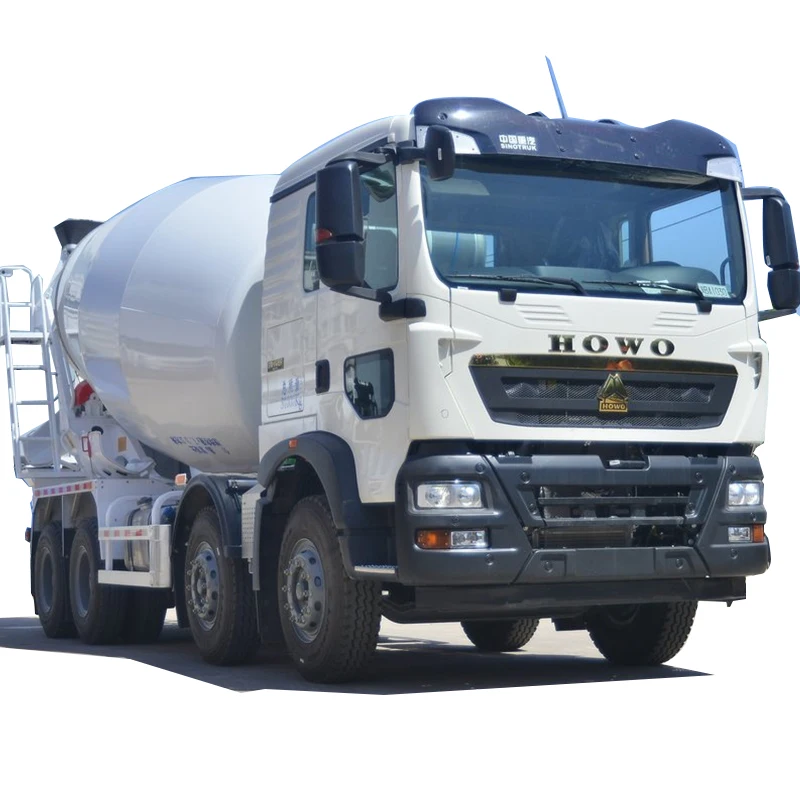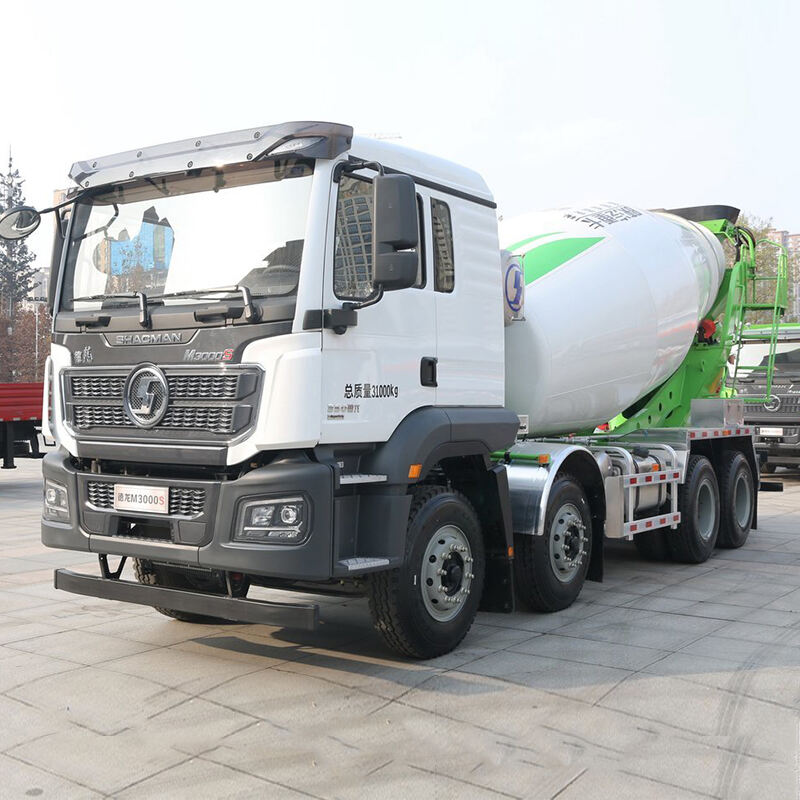24-D10, Building 3, Aosheng Building, Shunhua Road Street, Jinan, Shandong, China +86 13953140536 [email protected]
Concrete mixer trucks, sometimes called cement mixers or just plain concrete trucks, are really important for construction work because they both transport and mix concrete right at the job site. What makes these trucks special is their spinning drum that keeps everything moving so the concrete doesn't start to harden before it gets delivered. The whole construction world depends on them pretty much everywhere we look. Think about how much concrete gets used around the globe each year - somewhere around 14 billion cubic meters! That's why having these mixer trucks available is absolutely essential for big infrastructure developments as well as regular day to day building activities across all kinds of construction sites.
What goes into designing concrete mixer trucks matters a lot when it comes to keeping workers safe, getting the job done quickly, and making sure everything runs smoothly. Engineers follow strict guidelines during development to hit safety targets and keep operations running without issues. Stability remains a big concern when these trucks carry heavy loads, plus there's the need to control vibrations in the mixing drum so materials don't spill out意外地. Fuel efficiency also plays a role since nobody wants to waste money on gas. Groups like ANSI in America and CEN across Europe set rules that manufacturers must follow. These regulations help prevent accidents on site and build trust in the equipment over time. Ultimately, sticking to these standards means mixer trucks actually work as intended even as construction sites become more complex and demanding day by day.
Understanding the components of a concrete mixer truck is crucial for appreciating how these machines efficiently transport and mix concrete. Here’s a breakdown of the essential parts:
1. Drum: The drum is the most visible component, responsible for mixing concrete components and maintaining the mix's homogeny during transit. It is powered by a motor separate from the truck's engine, ensuring the concrete remains in constant motion, which prevents hardening before delivery.
2. Chassis: This serves as the truck's backbone, providing the structural support needed to withstand the significant weight of the concrete. The chassis is crucial for stability and maneuverability, especially on challenging construction site terrains.
3. Mixing System: This includes the blades and gear mechanisms that help keep the concrete mix agitated within the drum. The design of these blades plays a vital role in ensuring that the aggregate, cement, and water are thoroughly mixed, enhancing the quality of the concrete delivered.
4. Water Tank: Most mixer trucks have an onboard water tank to add water to the dry mix onsite, ensuring freshness. This is essential for adjusting the concrete's consistency and quality right before pouring.
All these parts work together to make sure a concrete mixer does its job well. The rotating drum keeps everything mixed evenly throughout the process. The frame itself stands up to rough handling on job sites day after day. What really matters though is how thoroughly the mixing mechanism blends all ingredients. And let's not forget about the water reservoir which lets operators adjust moisture levels as needed during transport. When all these elements function properly, contractors get consistently good concrete mix right when they need it most at their construction projects.
Concrete mixer trucks are absolutely essential on any construction site where timing matters. They make sure fresh concrete gets delivered exactly when needed while keeping the mix quality consistent throughout transport. Getting the concrete to the right spot at the right time isn't just about logistics it literally affects whether buildings stand strong or crumble later. We've seen what happens when there's a delay pouring concrete for foundations or structural elements the material starts setting improperly, weakening entire sections of a building. This becomes especially critical during big projects like skyscrapers or major infrastructure work where even small delays multiply into massive problems down the road. A single breakdown in the mixer truck schedule can throw off weeks worth of planning and cost thousands in lost productivity.
Concrete mixer trucks do a lot more than just move materials around. They actually mix better while on the road, cut down on physical work, and deliver much better quality concrete overall. When the truck keeps mixing during transport, the final product stays consistent without separating or losing strength. This saves time getting materials where they need to go and protects the concrete from going bad before it reaches the job site. Less manual work means lower payroll expenses too, since workers don't have to handle wet concrete as much, which cuts down on mistakes that happen when people try to mix things manually. Contractors across the country rely heavily on these specialized trucks because nobody wants cracked foundations or weak structures caused by poor mixing practices. The whole construction industry has basically made them essential equipment for any serious building project.
Concrete mixer trucks are vital for transporting and mixing concrete to construction sites, and generally fall into two main types: batch mixers and volumetric mixers. Batch mixers, often called ready-mix trucks, prepare the concrete mixture at a central facility before hauling it to the worksite. The benefit here is getting a uniform mix quality every time, which makes these ideal for big projects where consistency matters most. But there's a catch - drivers need to keep tight control over delivery times so the concrete doesn't start setting while still en route. Volumetric mixers work quite differently though. These act more like portable batching stations, storing all the raw ingredients separately until they reach the jobsite. Then they blend everything together right there on demand. This setup gives contractors real freedom to tweak the mix proportions as conditions change throughout the day, something that becomes really important when dealing with specialty mixes or unexpected site challenges.
Picking out the correct concrete mixer truck involves looking at quite a few different things. Project size matters a lot actually bigger jobs tend to work best with batch mixers since these can handle big volumes without breaking a sweat. But if the job calls for different amounts of concrete throughout the day or if it's somewhere hard to reach, then volumetric mixers make more sense. They cut down on waste because they make exactly what's needed right there on site. What about delivery needs? Jobs where concrete has to go straight into action with specific mixes might want volumetric mixers instead. These offer better control over the mix ratios and allow adjustments on the spot when conditions change unexpectedly.
The popular used HOWO A7 6x4 model with its 10 cubic meter capacity makes an excellent choice for moving concrete around construction sites big and small. Built using high tensile strength steel throughout the frame, these trucks stand up well against daily pounding and last much longer than cheaper alternatives. What really sets them apart though is the dependable hydraulic system that keeps everything running smoothly even after years of service. The mixing drum itself has been engineered differently from standard models too, allowing better blending of materials and faster unloading when time matters most on site.

The HOWO TX Concrete Mixer Truck comes with an impressive 12m³ mixing capacity that really sets it apart from competitors on the market today. Built to last, this heavy duty machine combines rock solid stability with remarkable work efficiency, something operators notice right away during operation. What makes this model particularly noteworthy is its exceptional fuel economy rates compared to similar trucks, plus a reinforced steel frame that withstands years of tough conditions without compromising structural integrity. Speaking of reliability, the truck's upgraded hydraulic system ensures smooth operation even under maximum load conditions. Safety conscious contractors will appreciate features like the emergency stop mechanism and improved visibility around blind spots, which together explain why so many construction companies across different regions have started specifying this particular model for their fleet requirements.

What sets the SHACMAN M3000s Concrete Mixer Truck apart is its solid 8x4 setup that gives it great load carrying ability and keeps things stable on the road. The engine packs plenty of power while still managing to burn fuel efficiently, which means operators save money over time. Built tough with a driver friendly interior, this mixer truck offers both comfort and safety during long hauls. Contractors looking for reliable equipment often turn to models like this one when they need something that can handle heavy workloads without breaking down.

Concrete mixer trucks are getting greener thanks to the arrival of electric models on the market. Take Pan United for instance who rolled out Singapore's very first all-electric concrete truck just last month. The numbers look impressive too the company claims their battery powered mixers cut down carbon emissions by around 45 percent when compared against regular diesel trucks. Beyond helping meet those international climate targets, these electric trucks actually save money over time since they don't need constant refueling or expensive engine repairs like traditional models do. Many construction firms are starting to see this as both an environmental win and smart business strategy.
The latest tech developments are changing how we approach mixing operations, particularly through automation systems and artificial intelligence integration. When machines take over the mixing process, they deliver much better consistency in product quality because there's less room for mistakes. Meanwhile smart AI systems keep an eye on everything happening during transportation too, making automatic tweaks as needed based on sensor data from the truck itself. What this means practically is faster production times, fewer errors caused by tired workers, and safer operations since predictive maintenance can spot problems before they become serious issues. Looking ahead, manufacturers of concrete mixer trucks will need to adopt these kinds of innovations if they want to stay competitive. The construction sector wants equipment that works smarter not harder, delivering both cost savings and environmental benefits without compromising on performance.
Good quality engineering makes a big difference when it comes to how well concrete mixer trucks work, stay safe, and get the job done right. When manufacturers put better materials into their designs and think carefully about how these trucks should be built, they create machines that handle both transportation and mixing tasks without so many problems or expensive breakdowns. Take engine improvements as just one example – newer models have engines that burn less fuel and produce fewer harmful gases, which is great news for contractors who want to cut costs and builders concerned about their carbon footprint. As cities grow and infrastructure projects multiply across the country, these kinds of engineering upgrades help keep pace with demand while still trying to do something good for the environment at the same time.
Picking the correct mixer truck for a construction job matters a lot, and good engineering advice makes all the difference here. Every construction site comes with its own set of challenges. Think about what kind of concrete they need mixed, how far it has to go from the batching plant, plus weather conditions at the actual worksite. A smart engineer will look closely at all these details before suggesting which concrete mixer truck fits best for the job. Getting this right means better results on site and longer lasting equipment too. Contractors who take time to match trucks with projects usually see fewer problems down the road. They get more done in less time while spending less money overall compared to those who just grab whatever truck happens to be available.